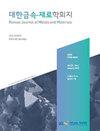Localized Corrosion Behavior of UNS N07718 in a Solution Simulating a Diluted-sour Environment
IF 1.4
4区 材料科学
Q4 MATERIALS SCIENCE, MULTIDISCIPLINARY
引用次数: 0
Abstract
The localized corrosion behavior of precipitation-hardened UNS N07718 was investigated by immersion tests in 6 wt% FeCl3 + 1.0 wt% HCl and the use of electrochemical techniques in a simulating solution of a diluted-sour environment of 25 wt% NaCl + 0.5 wt% CH3COOH. The Ti carbides and Nb-Mo carbides with 1-10 µm size were distributed in the alloy. After immersion at a solution temperature higher than 45oC, localized corrosion with a depth of over 25 µm was identified, and the critical pitting temperature was determined to be 45oC. Potentiodynamic polarization showed that the surface of the UNS N07718 was immediately passivated in the experimental solution. The passivity-maintaining current density was gradually increased with increasing solution temperature, and finally, localized corrosion was initiated or propagated at 0.5 VSSE in 80oC. The localized corrosion was initiated or propagated at the interface between the Ti and Nb-Mo carbides and the alloy substrate. Scanning Kelvin probe microscopic images revealed that the contact-potential difference values were in the order of Ti carbide > Nb-Mo carbide > alloy substrate, indicating that the carbides and alloy substrate act as a cathode and an anode, respectively, forming a micro-galvanic couple. Therefore, it is concluded that localized corrosion is initiated at the interface between the carbides and substrates in UNS N07718.UNS N07718在模拟稀酸环境中的局部腐蚀行为
通过在6wt%FeCl3+1.0wt%HCl中的浸渍试验和在25wt%NaCl+0.5wt%CH3COOH的稀释酸性环境的模拟溶液中使用电化学技术,研究了沉淀硬化UNS N07718的局部腐蚀行为。合金中分布着尺寸为1-10µm的Ti碳化物和Nb-Mo碳化物。在高于45℃的溶液温度下浸泡后,发现深度超过25µm的局部腐蚀,并确定临界点蚀温度为45℃。动电位极化表明UNS N07718的表面在实验溶液中立即钝化。钝化维持电流密度随着溶液温度的升高而逐渐增加,最终在80oC的0.5VSSE下引发或传播局部腐蚀。局部腐蚀在Ti和Nb-Mo碳化物与合金基体之间的界面处开始或扩展。扫描Kelvin探针显微镜图像显示,接触电势差值的顺序为Ti碳化物>Nb Mo碳化物>合金基体,表明碳化物和合金基体分别充当阴极和阳极,形成微电偶。因此,得出的结论是,UNS N07718中的碳化物和基体之间的界面处开始了局部腐蚀。
本文章由计算机程序翻译,如有差异,请以英文原文为准。
求助全文
约1分钟内获得全文
求助全文
来源期刊

Korean Journal of Metals and Materials
MATERIALS SCIENCE, MULTIDISCIPLINARY-METALLURGY & METALLURGICAL ENGINEERING
CiteScore
1.80
自引率
58.30%
发文量
100
审稿时长
4-8 weeks
期刊介绍:
The Korean Journal of Metals and Materials is a representative Korean-language journal of the Korean Institute of Metals and Materials (KIM); it publishes domestic and foreign academic papers related to metals and materials, in abroad range of fields from metals and materials to nano-materials, biomaterials, functional materials, energy materials, and new materials, and its official ISO designation is Korean J. Met. Mater.
 求助内容:
求助内容: 应助结果提醒方式:
应助结果提醒方式:


